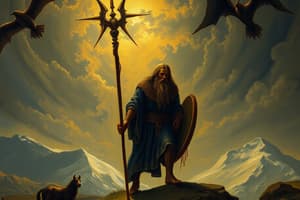Podcast
Questions and Answers
What term describes a narrative that begins in the middle of the action?
What term describes a narrative that begins in the middle of the action?
- Epic hero
- In media res (correct)
- Oral tradition
- Invocation of the Muse
Which character is known for their ability to turn men into animals?
Which character is known for their ability to turn men into animals?
- Circe (correct)
- Calypso
- Penelope
- Scylla
What does the term 'epic hero' refer to?
What does the term 'epic hero' refer to?
- A character who is often defeated by their enemies
- A character who experiences minimal conflict
- A character who embodies virtues admired by their culture (correct)
- A character who remains unnoticed in society
Which of the following is NOT a value commonly recognized in Greek culture found in The Odyssey?
Which of the following is NOT a value commonly recognized in Greek culture found in The Odyssey?
What does the term 'epic simile' refer to?
What does the term 'epic simile' refer to?
Flashcards are hidden until you start studying
Study Notes
Terms to Know
- Epic: A long narrative poem that details the adventures and exploits of heroic figures, often reflecting cultural values.
- Epic hero: A central character with extraordinary abilities and a noble quest, often facing great adversities.
- Flashback: A literary device that interrupts the chronological flow to present events from the past.
- Invocation of the Muse: A traditional opening where the poet calls upon a muse for inspiration in storytelling.
- In media res: A narrative technique that begins the story in the midst of action, often requiring exposition through flashbacks.
- Epithet/Homeric epithet: Descriptive phrases attached to characters, enhancing their traits (e.g., "swift-footed Achilles").
- Epic simile/Homeric simile: Extended comparisons that elaborate on a situation or character traits, often spanning several lines.
- Personification: Attributing human characteristics to non-human elements, often used to convey emotions or ideas.
- Oral tradition: The practice of sharing stories, histories, and cultural norms verbally, prior to the written word.
Concept Vocabulary
- Plundered: To seize goods or valuables through force; relates to war and conquest.
- Fugitives: Individuals who flee from danger or justice; often characters in peril.
- Avenge: Seeking retribution for a wrong; a recurring theme in heroic quests.
- Dispatched: To send someone away with speed; often relating to orders or missions.
- Ventured: To undertake a risky journey or adventure; shows bravery of characters.
- Tactics: Strategies used in achieving goals, especially in combat or conflict situations.
Key Characters
- Odysseus: The protagonist, known for his cunning and resourcefulness, striving to return home from the Trojan War.
- Polyphemus: The Cyclops who captures Odysseus and his men; represents the danger of isolation and brutality.
- Zeus: King of the gods, symbolizing authority and fate; often influences Odysseus's journey.
- Poseidon: God of the sea; antagonist to Odysseus, responsible for creating obstacles during his voyage.
- Helios: The sun god whose cattle are sacred; poses a significant challenge to Odysseus's men.
- Circe: A sorceress who entraps Odysseus's men; represents temptation and the need for wisdom.
- Calypso: A nymph who detains Odysseus on her island; embodies beauty and longing.
- Tiresias: A blind prophet who provides Odysseus with guidance in the Land of the Dead.
- Telemachus: Odysseus’s son; represents the next generation and the theme of loyalty.
- Penelope: Odysseus’s faithful wife, symbolizing loyalty and patience during his absence.
- Scylla: A monster with multiple heads; epitomizes unavoidable danger.
- Charybdis: A whirlpool that poses a great threat; symbolizes the chaos of the journey.
- Sirens: Creatures that lure sailors with their enchanting music, representing temptation.
Plot Elements
- The Trojan War: A significant conflict that serves as the backdrop for Odysseus's adventures.
- The Lotus Eaters: A group who tempt Odysseus's men with blissful forgetfulness, representing the dangers of complacency.
- The Cyclops: Encounter with Polyphemus tests Odysseus’s cleverness and heroism.
- The Land of the Dead: A pivotal moment where Odysseus seeks knowledge and guidance from Tiresias.
- Sirens: Their song represents the challenges of temptation and the struggle for self-control.
- Scylla & Charybdis: The choice between two monsters symbolizes tough decisions with inherent risks.
- The Cattle of the Sun God: A critical event involving disobedience, resulting in dire consequences.
Grecian Values
- The guest/host relationship (hospitality): A crucial cultural norm where hosts must treat guests with respect and generosity.
- Greek ideas on death and dying: Emphasis on honor and the afterlife; influences characters' actions and beliefs.
- Loyalty: Central to relationships, especially demonstrated by Penelope and Telemachus.
- Self-control: A valued trait, reflected in characters' struggles against temptation.
- Family: The foundation of Greek society; Odysseus's journey is driven by the desire to return to his family.
Bonus Characters
- Aeolus: The god of winds who aids Odysseus by providing a bag of winds; symbolizes both assistance and the fickleness of fortune.
- Circe: Additionally noted for her transformation of Odysseus’s men into animals, representing both danger and allure.
Studying That Suits You
Use AI to generate personalized quizzes and flashcards to suit your learning preferences.



